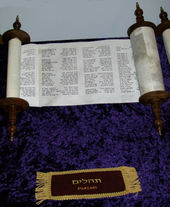Psalm 130
| Psalm 130 | |
|---|---|
| "From the depths, I have cried out to you, O Lord" | |
| Penitential psalm | |
 De profundis, in Les Très Riches Heures du duc de Berry, Folio 70r, held by the Musée Condé, Chantilly | |
| Other name |
|
| Language | Hebrew (original) |
Psalm 130 is the 130th psalm of the Book of Psalms, one of the Penitential psalms. The first verse is a call to God in deep sorrow, from "out of the depths" or "out of the deep", as it is translated in the King James Version of the Bible and the Coverdale translation (used in the Book of Common Prayer) respectively. It is one of 15 psalms that begin with the words "A song of ascents" (Shir Hama'alot). The Book of Psalms is in Ketuvim, the third section of the Hebrew Bible, and is a book of the Christian Old Testament. In the Greek Septuagint version of the Bible, and in the Latin Vulgate, this psalm is Psalm 129 in a slightly different numbering system. In Latin, it is known as De profundis.[1]
The psalm is a regular part of Jewish, Catholic, Lutheran, Anglican and other Protestant liturgies. It is paraphrased in hymns such as Martin Luther's "Aus tiefer Not schrei ich zu dir" in German. The psalm has been set to music often, by composers such as Orlando di Lasso and Heinrich Schütz. John Rutter set it in English as a movement of his Requiem.
Text[]
Hebrew Bible version[]
Following is the Hebrew text of Psalm 130:
| Verse | Hebrew |
|---|---|
| 1 | שִׁ֥יר הַֽמַּֽעֲל֑וֹת מִמַּֽעֲמַקִּ֖ים קְרָאתִ֣יךָ יְהֹוָֽה |
| 2 | אֲדֹנָי֘ שִׁמְעָ֪ה בְק֫וֹלִ֥י תִּֽהְיֶ֣ינָה אָ֖זְנֶיךָ קַשֻּׁב֑וֹת לְ֜ק֗וֹל תַּֽחֲנוּנָֽי |
| 3 | אִם־עֲוֹנ֥וֹת תִּשְׁמָר־יָ֑הּ אֲ֜דֹנָ֗י מִ֣י יַֽעֲמֹֽד |
| 4 | כִּֽי־עִמְּךָ֥ הַסְּלִיחָ֑ה לְ֜מַעַ֗ן תִּוָּרֵֽא |
| 5 | קִוִּ֣יתִי יְ֖הֹוָה קִוְּתָ֣ה נַפְשִׁ֑י וְלִדְבָ֘ר֥וֹ הוֹחָֽלְתִּי |
| 6 | נַפְשִׁ֥י לַֽאדֹנָ֑י מִשֹּֽׁמְרִ֥ים לַ֜בֹּ֗קֶר שֹֽׁמְרִ֥ים לַבֹּֽקֶר |
| 7 | יַחֵ֥ל יִשְׂרָאֵ֗ל אֶל־יְהֹ֫וָה כִּֽי־עִם־יְהֹוָ֥ה הַחֶ֑סֶד וְהַרְבֵּ֖ה עִמּ֣וֹ פְדֽוּת |
| 8 | וְהוּא יִפְדֶּ֣ה אֶת־יִשְׂרָאֵ֑ל מִ֜כֹּ֗ל עֲוֹֽנוֹתָֽיו |
A marginal note in the Masoretic Text tradition indicates that Psalm 130:2 is the middle of the whole Ketuvim (Book of Writings) section in Hebrew.[2]
King James Version[]
- Out of the depths have I cried unto thee, O LORD.
- Lord, hear my voice: let thine ears be attentive to the voice of my supplications.
- If thou, LORD, shouldest mark iniquities, O Lord, who shall stand?
- But there is forgiveness with thee, that thou mayest be feared.
- I wait for the LORD, my soul doth wait, and in his word do I hope.
- My soul waiteth for the Lord more than they that watch for the morning: I say, more than they that watch for the morning.
- Let Israel hope in the LORD: for with the LORD there is mercy, and with him is plenteous redemption.
- And he shall redeem Israel from all his iniquities.
Uses[]
Judaism[]

Psalm 130 is recited as part of the liturgy for the High Holidays, sung responsively before the open Torah ark during the morning service from Rosh Hashanah until Yom Kippur. The custom of reciting this psalm during these times had long lain dormant until it was revived in the Birnbaum and Artscroll siddurim in the 20th century.[3]
Psalm 130 is one of the 15 Songs of Ascents recited after the Shabbat afternoon prayer in the period between Sukkot and Shabbat HaGadol (the Shabbat prior to Passover).[4] In some congregations, it is said on every weekday. In Hebrew, it is often referred to as "Shir HaMa'alot MiMa'amakim" after its opening words.
It is recited during the Tashlikh prayer.[5]
It is one of the psalms traditionally recited "in times of communal distress".[6]
Verses 3-4 are part of the opening paragraph of the long Tachanun recited on Mondays and Thursdays.[7]
Catholic Church[]
According to the Rule of Saint Benedict established around 530, the psalm was used at the beginning of the vespers service on Tuesday, followed by Psalm 131 (130).[8][9]
In the current Liturgy of the Hours, the psalm is recited or sung at vespers on the Saturday of the fourth week,[a] and on Wednesday evenings. In the Liturgy of the Mass, Psalm 130 is read on the 10th Sunday of Ordinary Time in Year B, on the 5th Sunday of Lent in Year A,[b] and on the Tuesday in the 27th Week in Ordinary Time on weekday cycle I.[c] It is also used as the entrance antiphon on the 28th Sunday in Ordinary Time.
Literature[]
"De Profundis" was used as the title of a poem by Spanish author Federico García Lorca in Poema del cante jondo.
A long letter by Oscar Wilde, written to his former lover Lord Alfred Douglas near the end of Wilde's life while he was in prison, also bears the title "De Profundis", although it was given the title after Wilde's death. Poems by Alfred Tennyson, Elizabeth Barrett Browning, Charles Baudelaire, Christina Rossetti, C. S. Lewis, Georg Trakl, Dorothy Parker and José Cardoso Pires bear the same title.
In the novel Fires on the Plain by Shōhei Ōoka, the character Tamura makes reference to the psalm's first line "De profundis clamavi" in a dream sequence.[10]
Hymns[]
Martin Luther paraphrased Psalm 130 as the hymn "Aus tiefer Not schrei ich zu dir" (Out of deep distress I cry to you), which has inspired several composers, including Bach (cantatas Aus der Tiefen rufe ich, Herr, zu dir, BWV 131 and Aus tiefer Not schrei ich zu dir, BWV 38), Mendelssohn and Reger.
Musical settings[]
This psalm has been frequently set to music. It was sometimes used for funeral services, especially under its Latin incipit "De profundis":
Psalm 130[]
|
Latin[]
|
|
Some other works named De profundis but with texts not derived from the psalm are:
- Frederic Rzewski based on the text of Oscar Wilde
- Dmitri Shostakovich, in his Fourteenth Symphony op. 135, to texts of Federico García Lorca translated to Russian
English[]
|
French[]
|
German[]
|
Other[]
|
Notes[]
References[]
- ^ Parallel Latin/English Psalter / Psalmus 129 (130) Archived 2017-05-07 at the Wayback Machine medievalist.net
- ^ Shepherd, Michael (2018). A Commentary on the Book of the Twelve: The Minor Prophets. Kregel Exegetical Library. Kregel Academic. p. 23. ISBN 978-0825444593.
- ^ Cohen, Jeffrey M, 1,001 Questions and Answers on Rosh Hashanah and Yom Kippur, p. 167.
- ^ Scherman, Rabbi Nosson (1984). The Complete Artscroll Siddur (3rd ed.). Mesorah Publications Ltd. p. 530. ISBN 0-89906-650-X.
- ^ Scherman (2003), p. 772.
- ^ Weintraub, Rabbi Simkha Y. "Psalms as the Ultimate Self-Help Tool". My Jewish Learning. Retrieved January 18, 2018.
- ^ Scherman (2003), p. 125.
- ^ Psautier latin-français du bréviaire monastique, 2003 [1938], p. 502.
- ^ Rule of Saint Benedict, traduction de Prosper Guéranger, Abbaye Saint-Pierre de Solesmes, 2007 [réimpression]CS1 maint: others (link).
- ^ Ōoka, Shōhei (1957), Fires on the Plain, Tokyo, Japan: Tuttle Co., p. 86, ISBN 978-0-8048-1379-2.
- ^ Psalm 130 Sikorski
- ^ Francesco Barsanti: Sei Antifon, Op. 5 in Sacred Vocal Music, 2018
- ^ Free scores by De profundis clamavi (Nicolaus Bruhns) in the Choral Public Domain Library (ChoralWiki)
- ^ Free scores by De Profundis H 156 (Marc-Antoine Charpentier) in the Choral Public Domain Library (ChoralWiki)
- ^ Free scores by De Profundis H 189 (Marc-Antoine Charpentier) in the Choral Public Domain Library (ChoralWiki)
- ^ De Profundis Clamavi ad Te, Lietuvą: Elements of Lithuanian Nationalism in Čiurlionis’s De Profundis Cantata
- ^ De Profundis, S.23 (Lalande, Michel Richard de): Scores at the International Music Score Library Project
- ^ Data BNF. ata.bnf.fr/fr/13893216/henry_desmarest/ "Henry Desamrest" Check
|url=value (help). - ^ Free scores by De profundis clamavi (Josquin des Prez) in the Choral Public Domain Library (ChoralWiki)
- ^ De Profundis Oratorienchor Potsdam
- ^ De profundis clamavi / composer / Andrea Gabrieli (c1510-1586) Hyperion Records
- ^ Free scores by De profundis clamavi (Christoph Willibald Gluck) in the Choral Public Domain Library (ChoralWiki)
- ^ David Fay: Sofia’s Choice: Gubaidulina at 80 at the Royal Academy of Music BachTrack.com, 23 February 2012.
- ^ [Arthur Honegger / Symphony No. 3 'Liturgique'] BBC
- ^ La Flute de Pan. "De profundis".
- ^ Pothárn Imre. "De Profundis Clamavi"
- ^ Out Of The Depths (Psalm 130) op. 142; 3 Edition Peters
- ^ "Boulanger, Lili, Musical score". Repertoire Explorer. Retrieved 12 March 2016.
- ^ The attribution of the melody is uncertain, see Braatz, Thomas; Oron, Aryeh. "Chorale Melody: Aus tiefer Not schrei ich zu dir (I+II)". www.bach-cantatas.com. Retrieved 17 February 2020.
Sources[]
- Kuttner, Henry (1953). "De Profundis (also known as The Visitors)". Science Fiction Quarterly.
- Leinster, Murray (1945). "De Profundis". Thrilling Wonder Stories.
- Oracz, Michal (2001). De Profundis: Letters From The Abyss. Redhill, Surrey: Hogshead Publishing. ISBN 1-899749-35-7. Archived from the original on 2008-02-25. Retrieved 2008-03-09.
External links[]
| Wikisource has original text related to this article: |
| Wikimedia Commons has media related to Psalm 130. |
- Text of Psalms 126–131 from the 1662 Book of Common Prayer
- Text of Psalms 107–150 from the 1979 Episcopal Book of Common Prayer
- Nova Vulgata Online: Psalm 130
- Pieces with text from Psalm 130: Scores at the International Music Score Library Project
- Psalm 130: Free scores at the Choral Public Domain Library (ChoralWiki)
- Psalms Chapter 130 text in Hebrew and English, mechon-mamre.org
- Out of the depths I call to you, LORD; text and footnotes, usccb.org United States Conference of Catholic Bishops
- Psalm 130:1 introduction and text, biblestudytools.com
- Psalm 130 enduringword.com
- Psalm 130 / Refrain: My soul waits for the Lord. Church of England
- Hymns for Psalm 130 hymnary.org
- De Profundis – excerpted text of Wilde's De Profundis (1905 version?)
- "De Profundis". Catholic Encyclopedia. – From the 1908 Catholic Encyclopedia, this short article talks about the hymn's origins and its Jewish and (pre Vatican II) Roman Catholic usage.
- De profundis at IMDb
- "Translation of BWV 131: Aus der Tiefen rufe ich, Herr, zu dir".
- Psalms
- Latin-language Christian hymns
